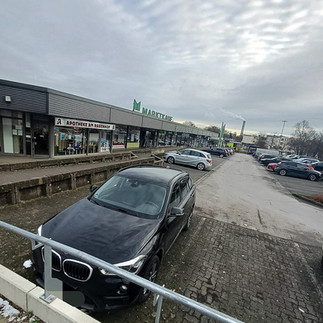Ask around! What’s “ghetto”? Does your neighborhood define you?
- Jannis Nolting

- Oct 7, 2024
- 6 min read
Updated: Jan 14, 2025
Integration is highly debated in Denmark right now, discussions of what to do with one of Europe’s biggest “ghettos”. A Wikipedia statistic showed how Mjølnerparken, Denmark, looked back in 1993, about 36% of the residents weren’t of Danish origin. By 2003, this had shifted, with 91% of the population being immigrants or their descendants.
Problems in “ghettos” include high unemployment, low income, and a lack of integration. These social challenges come together to create the so-called “parallel-Gesellschaft”, where communities live and exist among each other separate from the dominant society. This is due to changing populations due to migration and weak integration politics. Germany is having integration debates too, where we have also experienced major population changes due to migration.

We have similar developments in Bielefeld, not to the extent in Mjølnerparken, but one section of the city has become the butt of jokes: “Baumheide,” our local “ghetto.” But Baumheide is home for many at our school. As one student put it, “I myself have never been in a serious conflict with other Baumheide residents, but I have heard a few stories so far.” What is “ghetto”? Does your neighborhood define you?
I interviewed a couple 10th graders to see what they think about the dynamics in their neighborhoods.
Daniel, 15, has lived 10 years in Baumheide (Bulgarian)
Jannis: How did it feel like growing up in Baumheide?
D1: I would say, it was pretty normal, because I don't know the feeling of having grown up somewhere else and I can't relate it to Heepen, or something like that. In everyday life, I don't have the feeling that I'm in a ghetto, but rather at home in Baumheide, and everything around it is completely normal. I've been here since I was a child. I didn't even know what a ghetto was, so that was a given for me. I live there, and I haven't questioned whether it's a ghetto.
Jannis: How was the school, were there any problems?
D1: Yes, there were actually a few problems that had to do with violence, not only from foreigners to Germans, but also from German against foreigners. Even in elementary school, there were many incidents that came from Germans against foreigners. Then we realized why we should perhaps try to have a more balanced ratio of Germans and foreigners, but because there are so many people that don’t work. You can't say that there are enough foreigners or Germans in our class now. If you throw them all together, different cultures often don't get along so well. Once my German friend Julien even stabbed my Kurdish friend Hadam with a pair of scissors, but I can't remember why. Maybe what children hear from their parents about other people has a lot to do with upbringing - clichés like: Germans and foreigners all live on public aid and don't want to work. Unfortunately, I was also there in one story. Hadam and I teamed up against the German, Julien, and teased him for no reason, because we were simply stupid and young.
Jannis: What are other common clichés you hear all the time?
D1: I usually hear that all Baumheide residents are anti-social and foreigners. I wouldn't confirm the former because you can never say that everyone is like that. There are always exceptions, but the point that most foreigners live there is true: because the apartments are simply cheaper. But most people who may have fled and haven't been in Germany for that long have no choice but to be content with that. Otherwise, you would have to use containers or refugee homes as an alternative living situation, and people would of course be integrated much worse. I also often hear that there are mostly large families or so-called clans. I have to say that I have also witnessed an incident where one saw this criminal gang. There was a mass brawl of up to a hundred people who were divided into two groups in front of my block. But in my opinion, the connection between normal extended families and clans is not that great in Baumheide. I think there are such large families partly for financial reasons, for child benefits, or simply because it is tradition.
Jannis: Do you benefit from growing up in a multicultural district like Baumheide? How so?
D1: I go shopping myself everyday, and in Baumheide there are a variety of grocery stores from other cultures. For example, “hevi markt”, a shop that mainly sells Kurdish products, or “mix markt”, a Russian supermarket chain here in Baumheide and the surrounding area. This means that residents of Baumheide have the advantage of keeping their culture alive in Germany.
Jannis: It sounds like Baumheide is also very rich in cultural aspects.
D1: Yes, definitely. In other districts, where more German people live, the variety is less, and in my opinion, more boring, so I’m happy with that.
Jannis: Which problems do you feel are real?
D1: In my view, there are not many, but one time I was at my favorite Kebab store and the boss let his kids work there with him. It was really full and stressful for the kid, and his dad shouted at him and made him work under pressure at a young age - that really was child labor. Otherwise, I haven't noticed anything like that. Of course, there are things in the media, but at the moment, it's improved quite a bit from other places in Bielefeld, like the Kesselbrink, where there are a lot of different people in one place - you hear way more stories about drunks and junkies. So, the media pretty much overstates Baumheide’s problems, in my opinion.
Jannis: Do you think demolition makes sense in extreme ghettos, to restructure the society? (Not necessarily Baumheide, more like Mjølnerparken)
D1: I think, maybe if you accompany people and explain how the German or Danish system works, the laws work. Of course, you also have to have your own initiative, but language barriers don't allow everything, so language courses from experts would help and basic rules and values that are important in the country, must be passed on to the inhabitants of a parallel society.
Daniel Hein, 16, lives in Baumheide (Russian)
Jannis: I know you grew up in Baumheide, so let’s start with a simple question: How was it growing up there?
D2: It wasn’t that bad, but it wasn’t anything special either. People just live and work there, but I’ve never really felt connected to the place. It’s a little rough, but not terrible. It’s just not my thing. Some people love their hometowns, but I don’t feel that way.
Jannis: How was school? Was it difficult growing up there? I know Baumheide’s schools aren’t the best.
D2: Yeah, the schools weren’t great. I went to the same school as the other Daniel. There was always a lot of tension. Not just with the teachers, but the students. A lot of kids came from tough situations, which led to fights and chaos in class. But to be honest, I didn’t really care. School was just something I had to do, not something I was excited about.
Jannis: Interesting. What about the stereotypes, what people from outside say about Baumheide? I’m sure you’ve heard some. What do you think about them?
D2: Oh yeah, people always talk about it like it’s a dangerous place. They call it a "ghetto" and focus on crime. There are problems, but it’s not as bad as they make it sound. It’s just a regular neighborhood where regular people live. I think people exaggerate, especially if they’ve never been there. They hear bad things and assume it’s all bad.
Jannis: Yeah, that’s true. So, growing up in a multicultural place like Baumheide did that help you in any way?
D2: You’re exposed to lots of different cultures and languages, which helps you understand the world better. You learn to get along with all kinds of people. If you’re open to it, that’s a big advantage. But to be honest, it didn’t make me love the place. It’s just something I learned from.
Jannis: What do you think are the biggest problems in Baumheide?
D2: There’s not much to do, especially for young people. A lot of them end up falling into bad habits or getting into the wrong things. It’s tough for someone without good role models or a supportive family. But, like I said, I just do my own thing and don’t care what other people think.
Jannis: So, you didn’t feel like Baumheide had much to offer you?
D2: Not really. It was just a place I lived. I didn’t hate it, but I didn’t love it either. Some people stay connected to their roots, but for me, I always think this place is not forever. I just never felt like it was my real home. I would rather live somewhere out in the wilderness, in peace.
Jannis: One last question: Do you think people from places like Baumheide have a harder time in life, or is it more about mindset?
D2: It’s a bit of both. Some people have it harder, but mindset matters a lot. If you think that where you come from is all you’ll ever be, then you won’t get far. But if you’re willing to look beyond your neighborhood, there’s a lot more out there for you. It really depends on the person. Baumheide doesn’t have to hold you back, but it can if you let it.
Jannis: Thanks for the interview.






















Comments